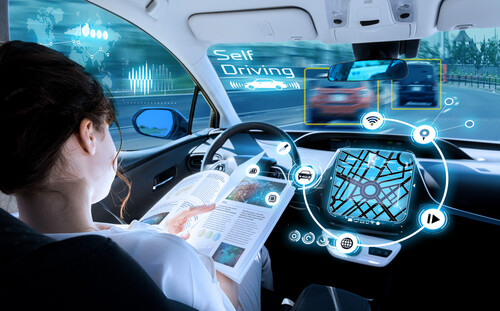Self-driving cars and trucks once seemed like a staple of science fiction which could never morph into a reality here in the real world. Nevertheless, the past few years have given rise to a number of impressive innovations in the field of autonomous vehicles that have turned self-driving cars from a funny idea into a marketing gimmick and finally into a full-fledged reality of the modern roadway. A number of pressing issues are still holding these autonomous vehicles back from full-scale production and widespread societal embrace, however, chief amongst them the data management challenge wrought by self-driving vehicles.
How should companies approach the dizzying data maze of autonomous vehicles? Here?s how to solve the data management of self-driving cars, and what leading automotive companies are already doing.
Uber and Lyft want to release self-driving cars on the public
Perhaps the most notable development in the creation of autonomous vehicles over the past few years has been that Uber and Lyft have both recently announced that they?re interested in releasing self-driving cars to the general public. In other words, these companies want autonomous vehicles that are navigating complex city environments by themselves and without the assistance of a human driver who can take over in the event of an emergency.
Uber has already spent a whopping $1 billion on driverless cars, perhaps because the ridesharing app relies heavily on a workforce of freelancers who aren?t technically considered full-time employees. It could be that Uber and other companies see a financial imperative in automating their future workforce so that they don?t have to fret about providing insurance and other benefits to a large coterie of human employees. Whatever the company?s motivations, Uber has clearly established itself as a leader in the self-driving car space where investments are concerned and will continue to be a major player for the foreseeable future.
Other companies like Ford may have the right idea, as they?re moving in the opposite direction of Uber and trying to take things slowly when debuting their autonomous vehicles. This is because Ford believes that solving the data management challenge of self-driving cars takes time and caution more than it does heavy spending and ceaseless innovation. Ford?s anti-Uber approach to self-driving cars could pay off, too, as the company has avoided the disastrous headlines that have followed Uber everywhere when it comes to testing and general brand PR.
We can learn from Ford in one regard; haste, though important when delivering a product to market, often results in shoddy production that leads to costly mistakes. The company is deciding to take things slow when it comes to collecting and managing data from auto insurance companies, which is a standard others should be following if they don?t want to get in over their heads. Ford?s focus on creating data ?black boxes? not dissimilar to those on airplanes, which can be consulted in the event of a major crash or incident for a data log of what occurred, is going to become a standard feature of autonomous vehicles before long.
It?s a matter of trust
It?s going to become increasingly obvious over the next few years that solving the data management challenges wrought by the advent of self-driving cars is going to be a matter of trust. Drivers need to be certain that their cars aren?t acting as surveillance devices, as does society broadly speaking, and manufacturers need to be taking steps to build and strengthen trust between those who make the car, those whose data the car collects, and those who analyze and utilize such data for commercial gains.
The fierce competition between Tesla and Waymo is worth watching in this regard, largely because the profit incentives of the capitalist marketplace will almost assuredly lead both of these companies to throw caution to the wind in their race to beat one another via self-driving cars. We will only be able to solve the data management challenge issued by autonomous vehicles if we learn that sometimes competition needs to be put aside in the name of cooperation that can solve public health crises like deaths resulting from self-driving vehicles.
The data management challenge posed by self-driving cars demands that that auto and insurance industries also take ethics into consideration to a hitherto undreamt-of extent. Modern vehicles are becoming surveillance hubs in and of themselves, with Tesla?s newest non-lidar approach to self-driving car data collection proving to be more accurate ? and thus necessarily more invasive ? than nearly any other technique that?s yet been pioneered. While this may help Tesla in the sense that it?s propelling the company ahead of its adversaries technologically speaking, it poses immense ethical questions like what the responsibility of the market leader is when it comes to fostering innovations which necessarily surveil the public in order to function.
It?s a self-driving world now
The data management challenges being generated by the ceaseless advance of self-driving vehicles won?t go away anytime soon, as we?re now in a self-driving world where automation, data collection (another term for surveillance), and programmatic decision-making is the new normal. While we?ve grown so used to always being the one doing the driving, humans are now being put in the backseat and must trust in the capacity of machines to deliver us to a brighter future. In order to arrive at our destination unimpeded, we need a new focus on ethics across the automotive and insurance industries that will ensure this new technology is primarily used for good.
Additional regulation will be needed in order to protect the privacy of everyday people, and modern infrastructure must be constructed in order to alleviate the sensory-burden being placed on autonomous vehicles if they?re to succeed in the long-term. The good news for those who love self-driving cars is that the profit incentive is enough to make companies plow ahead regardless of the data management challenges they?re facing. This could result in huge ethical dilemmas later on, though, so those interested in self-driving cars can?t allow humans to become unmoored from the driver?s seat if we want our values to be represented on the roads of tomorrow.








